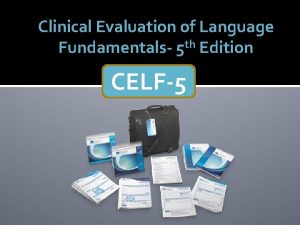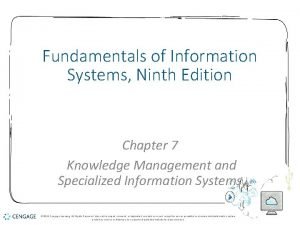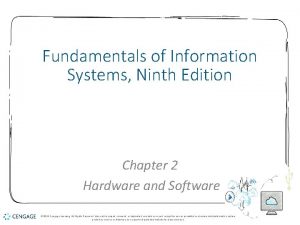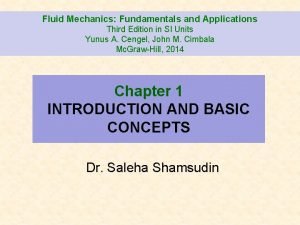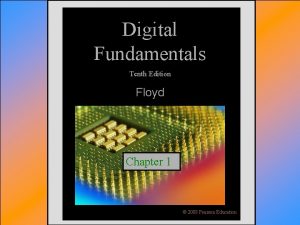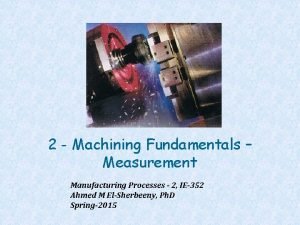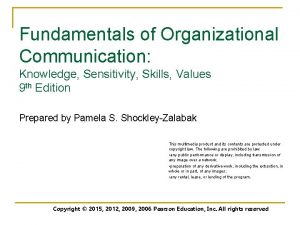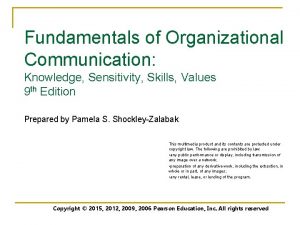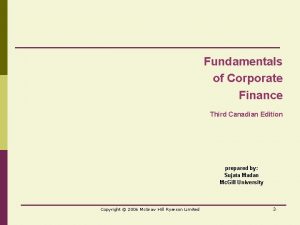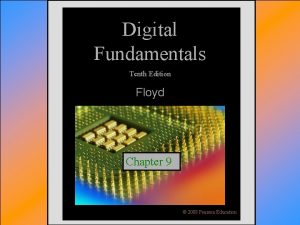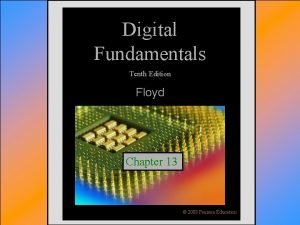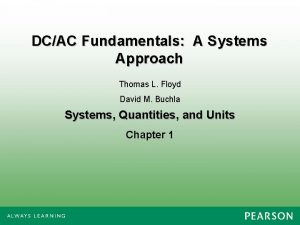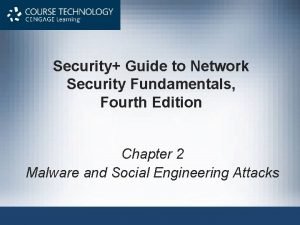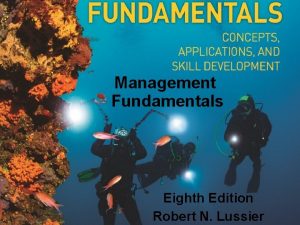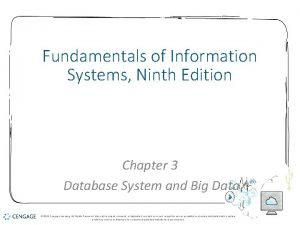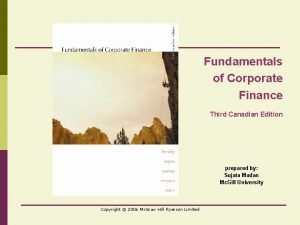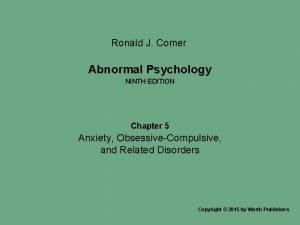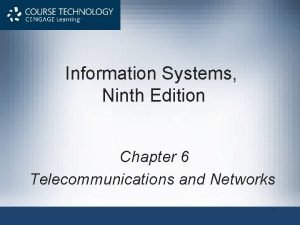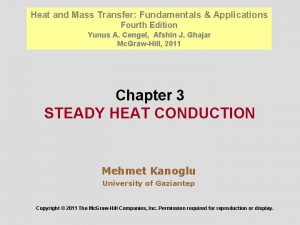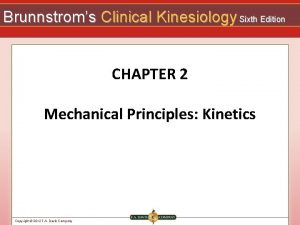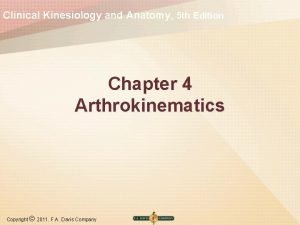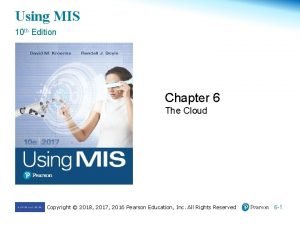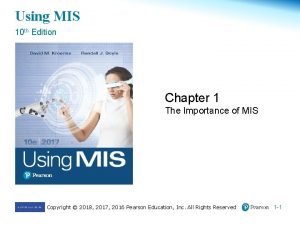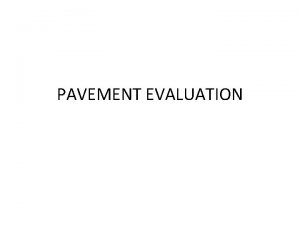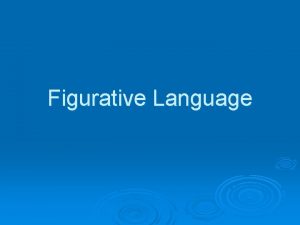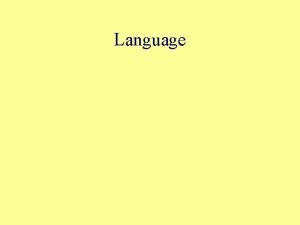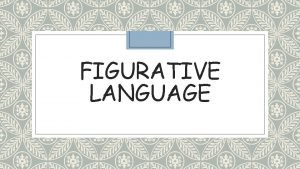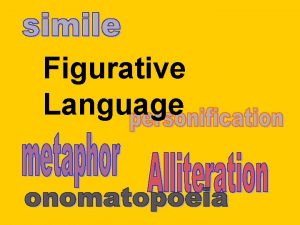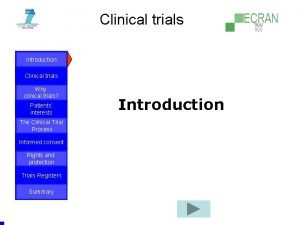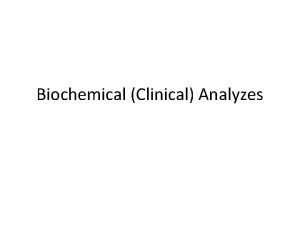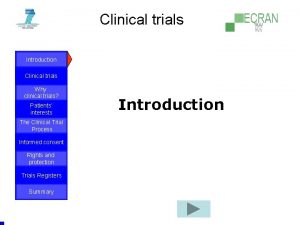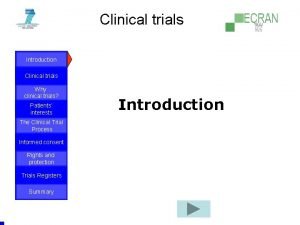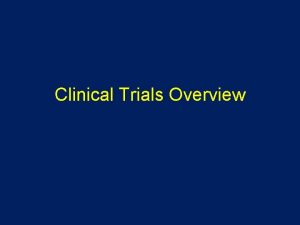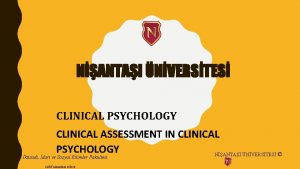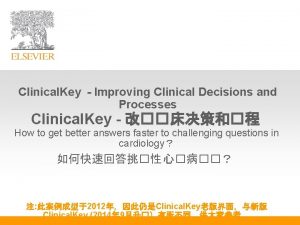Clinical Evaluation of Language Fundamentals 5 th Edition

























- Slides: 25

Clinical Evaluation of Language Fundamentals- 5 th Edition CELF-5

Clinical Evaluation of Language Fundamentals- 5 th Edition Materials • Examiner’s Manual • Stimulus Books 1 & 2 • Record Forms (protocol) Form 1: Ages 5 -8 Form 2: Ages 9 -21 • Observation Rating Scale • Reading and writing Supplements 1 & 2 CELF-5

CELF-5 (Clinical Evaluation of Language Fundamentals) �A comprehensive tool for the identification, diagnosis and follow-up evaluation of language and communication disorders �Administered by SLP, Psychologists, Sp. Ed �Ages: 5 -21 years old Record Form 1: 5 -8 years old Record Form 2: 9 -21 years old


Step 1 : Collect authentic information about language �Observational Rating Form �Anecdotal notes in context

Step 2: Identify the presence of a language disorder. � Core Language Score Overall measure of child’s language abilities Typically used to identify presence/absence of a language disorder ▪ Once presence of lang. disorder is evident, then define based on modality affected (receptive, expressive, etc. ) � Combines Individual Subtest Scaled Scores: Record Form 1: SC, WS, FS, RS Record Form 2 (9 -12 y. o. ): WC, FS, RS Record Form 2 (13 -21 y. o. ): FS, RS, USP

Step 3 : Describe the nature of the disorder: Indexes

Administering the CELF-5 Determine what form to use Determine Indexes to explore 1. 2. Use the chart on Record Form p 1 to determine necessary subtests to administer Administer subtests in any order 4. Record subtest raw scores on first page of protocol 5. Use Appendix A & B in Manual to change raw to derived scores 6. Use derived scores to examine child’s profile 3.

CELF-5 FINE POINTS � TAPE RECORD! subtests that require you to write responses verbatim: FS, RS, WS, USP & WD. � Demo & Trial Items ALWAYS give before test items administered If child unable to do these after prompting/encouraging, discontinue test � Repetitions: do not repeat items on subtests that evaluate student’s receptive language (the ability to process, interpret and recall or reproduce auditory info): RS, FD. All other subtests, you can repeat items one at a time or as needed. Don’t repeat when the first response is wrong.

BASAL RULE Applies to ALL subtests: �Use suggested starting points �If begin at #1, basal is already set �If begin later than #1, student must get perfect score on first two items administered If YES, award full credit for items prior to the start point and proceed with the subtest If NO, go back to Item 1 and administer all items before the start point. Don’t re-administer items student missed but continue testing beyond this point

CELF-5 SCORING RULES �When uncertain “how to score a response and cannot decide if you should discontinue a subtest, administer more items until you are certain the discontinue rule has been met. �If, during scoring, you find that you administered items beyond the point at which you should have discontinued testing, do not award points for the items beyond the correct discontinue point, even if the student’s response would have earned credit. ” (p. 15).

CELF-5 SUBTESTS on BOTH Form 1&2 Following Directions (FD) Recalling Sentences (RS) Formulated Sentences (FS) Word Classes (WC) Understanding Spoken Paragraphs (USP) Pragmatics Profile

CELF-5 ADDITIONAL SUBTESTS Form 1 (ages 5 -8) Word Structure (WS) Sentence Completion (SC) Linguistic Concepts (LC)

CELF-5 ADDITIONAL SUBTESTS Form 2 (ages 9 -21) Word Definitions (WD) Sentence Assembly (SA) Semantic Relationships (SR)

Word Classes (WC) “which go together? ” � Manual p. 46 � Easel: only ages 5 -10 use stimulus book 1 � Repetitions- OK SCORING: (item analysis table: protocol) Circle the words student gives in response Correct responses are in bold: circle 1 or 0 Discontinue after 4 consecutive zeros

Following Directions (FD) “point to the…” Easel: student side � Stimulus book 2 Manual p. 51 � NO Repetitions BUT make sure have child’s attention before giving item SCORING: (response key) 1, 2, 3= specified order and= must point to both or= can point to either Protocol

Recalling Sentences (RS) “say the sentence back to me” � � TAPE RECORD! Manual p. 74 NO Repetitions- make sure child is listening SCORING (p. 77): Use editing symbols 1 error 3: zero errors ▪ any word changed, added, substituted or omitted 2: one error ▪ transposition that doesn’t change meaning: The play castle was built by 1: two-three errors the boys and girls 0: more than four 2 errors ▪ transposition that does change meaning: The tractor was followed by the bus ▪ Count contractions as 2 words (using appropriate contracted form ok) Dialectal variations (guidelines p. 78 & Appendix I)

Formulated Sentences (FS) “use it in a sentence” � � � TAPE RECORD! Repetitions OK Stimulus book 1 Manual p. 55 Write responses verbatim SCORING: (scoring guide p. 60) 2: complete & accurate sentence using target word 1: complete sentence using target word with one or two errors 0: doesn’t use word, incomplete, 3 or more errors, or not about picture Credit Rules: ▪ Can be part of a dialogue, animal can be speaker, can be stated in 1 st person, can be in form of a ? or statement ▪ If give 2 sentences, score each sentence separately & score sentence with the word Zero points ▪ No target word used, target word change, or not about the picture Dialectal Variations: p. 57

Understanding Spoken Paragraphs (USP) “retell the story” � TAPE RECORD Manual p. 81 � Repetitions: NO for paragraphs, 1 x for questions � Administer the trial and all 3 stories for child’s age � Can read trial paragraph & ? ’s 2 x if needed � In TRIAL: if answers are vague/incomplete, prompt for answers only in trial by providing cues � In TEST: if answers are ambiguous say, “Can you tell me more? ” SCORING: (error analysis table on protocol) � ()= answer is optional, comma=multiple parts, / = either is correct

Word Definitions (WD) Record form 2 “define the word- tell what the word means” � TAPE RECORD! Directions: Manual p. 88 � Write responses verbatim! Discontinue: 4 consecutive zeroes � Repetitions: OK: If vague response, prompt: “Can you tell me more” SCORING: error analysis table in protocol AND= both criteria required; OR= either criteria required / = either is correct; ()= optional response; [ ] examiner directions See manual for more guidelines

Sentence Assembly (SA) “put the word into 2 sentences” � Stimulus book 2 Manual p. 93 � Repetitions: OK � Discontinue: 4 consecutive zeroes SCORING: error analysis table in protocol write student’s response verbatim if not listed 1 point: gives 2 accurate responses 0 points: gives 1 or no responses Record form 2

Semantic Relationships (SR) “a teenager is older than…” � Stimulus book 2 Manual p. 97 � Repetitions: OK � Discontinue: 4 consecutive zeroes SCORING: error analysis in protocol Must get both correct to score 1 Record form 2

Record form 1 Sentence Comprehension (SC) “which picture represents the sentence” � Stimulus book 1 Manual p. 34 � Repetitions: OK � Discontinue: 4 consecutive zeros SCORING: item analysis in protocol Circle letter corresponding to student’s response (correct responses are bold font) Then circle 1 for correct, 0 for incorrect A B C D

Linguistic Concepts (LC) Record form 1 “Point to…” � Stimulus book 1 Manual p. 38 � Repetitions: NO � Discontinue rule: 4 consecutive zeros � Italicized word in item prompt: target concept but examiner does not emphasize in directions SCORING: item analysis in protocol 1, 2, 3= specified order; = any order; and = both; or = either

Word Structure (WS) Record form 1 “Listen carefully to what I say about the picture and help me finish what I say about each one”” � Stimulus book 1 Manual p. 42 � Repetitions: OK � Administer ALL items! � Blue line on protocol indicates page change SCORING: Item analysis on protocol, Appendix I: dialectal variations Write response or circle it; correct responses are in brackets If response is related with correct structure, score as correct If related but incorrect, prompt, “Can you say it another way? ”
 Celf 5 record form
Celf 5 record form Fundamentals of information systems 9th edition
Fundamentals of information systems 9th edition Fundamentals of information systems 9th edition
Fundamentals of information systems 9th edition No slip condition
No slip condition Floyd digital fundamentals 10th edition
Floyd digital fundamentals 10th edition Machining fundamentals 10th edition
Machining fundamentals 10th edition Fundamentals of organizational communication 9th edition
Fundamentals of organizational communication 9th edition Fundamentals of organizational communication 9th edition
Fundamentals of organizational communication 9th edition Sujata madan
Sujata madan Floyd digital fundamentals ppt
Floyd digital fundamentals ppt Digital fundamentals by floyd
Digital fundamentals by floyd Dc/ac fundamentals a systems approach
Dc/ac fundamentals a systems approach Computer security fundamentals 4th edition
Computer security fundamentals 4th edition Management fundamentals 8th edition
Management fundamentals 8th edition Fundamentals of information systems
Fundamentals of information systems Fundamentals of corporate finance third canadian edition
Fundamentals of corporate finance third canadian edition Fundamentals of corporate finance fifth edition
Fundamentals of corporate finance fifth edition Fundamentals of corporate finance 6th edition
Fundamentals of corporate finance 6th edition Abnormal psychology ronald j comer 9th edition
Abnormal psychology ronald j comer 9th edition Fundamentals of information systems 9th edition
Fundamentals of information systems 9th edition Fundamentals of heat and mass transfer 4th edition
Fundamentals of heat and mass transfer 4th edition The fundamentals of political science research 2nd edition
The fundamentals of political science research 2nd edition Brunnstrom's clinical kinesiology 7th edition
Brunnstrom's clinical kinesiology 7th edition Clinical kinesiology and anatomy 6th edition
Clinical kinesiology and anatomy 6th edition Using mis (10th edition) 10th edition
Using mis (10th edition) 10th edition Report
Report
